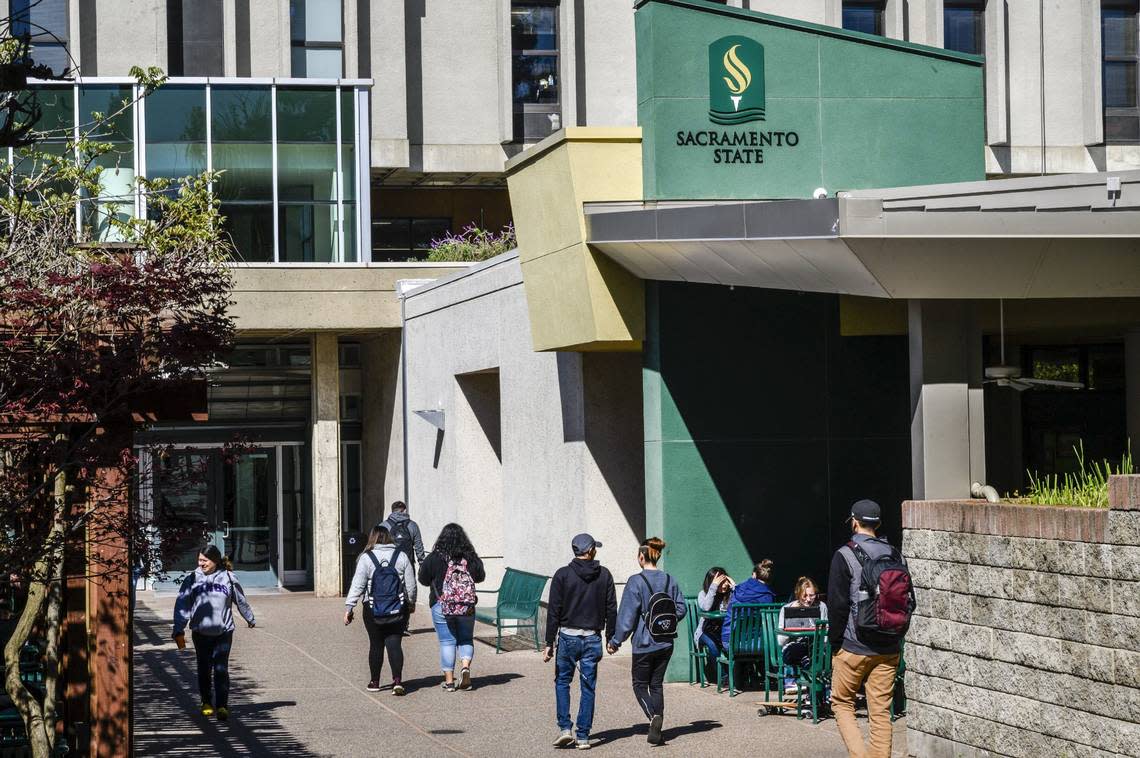CSU administrators flamed at Capitol for handling of sexual misconduct investigations

As nearly half a million students returned to dorms and classrooms at California State University’s 23 campuses, the university’s leadership was under scrutiny — and severe criticism — by the Legislature.
In a second oversight hearing this week, legislators grilled administrators for over three hours after two reports released in July concluded that CSU was not adequately responding to allegations of sexual harassment on its campuses. CSU promised to adhere to the recommendations in the two reports, but legislators, citing a lack of trust in CSU leadership, said they needed to take accountability into their own hands.
“The Chancellor’s Office says they’re going to fix things, but really has failed us,” said Asm. Dawn Addis, D-San Luis Obispo. “I don’t see how anyone at the top are going to be held accountable, I don’t see timelines and I don’t see a commitment at getting this done.”
CSU’s Interim Chancellor Jolene Koester pledged to adhere to all of the recommendations in the reports. Vice Chancellor for Human Resources Leora Freedman also said she would report back to the Legislature annually. Incoming Chancellor Mildred García, set to take the seat on Oct. 1, was not present at the hearing.
The administrators cited a “resource-starved” environment for creating many of the gaps in the system — a condition corroborated by the 250-page report conducted by the law firm Cozen O’Connor. The firm interviewed nearly 2,000 people and collected 1,800 survey responses at the 23 campuses.
“The CSU is not unique. We could find issues of this caliber and this degree at most institutions in the country,” said Leslie Gomez, the co-chair of Cozen O’Connor’s institutional response group. “What is unique about the CSU, and what exacerbates the issues, is the extreme extent of the resource constraints that each of the 23 universities and the Chancellor’s office operate within.”
CSU is running a $1.5 billion funding gap. Its Title IX offices are under-funded and understaffed, the Cozen O’Connor report concluded. The staff that do exist are spread thin, resulting in high rates of burnout and turnover, the report detailed. The situation exacerbates documentation and records management issues.
Both reports identified insufficient documentation as a major issue for the CSU Title IX process. Of the 40 cases closely examined by the Auditor, 15 were closed before investigation took place. Eleven of the 15 lacked “clear rationale” for closing a complaint, meaning no one detailed in writing why an investigation was not pursued.
Two hearings, one week: a sign of ‘a lack of leadership’?
When CSU administrators appeared before the committee on Thursday, their seats were still hot from a Tuesday hearing on the university’s failure to comply with state law and repatriate 698,000 Native American human remains and artifacts.
Grant Parks, a California state auditor, said the reason the university system had failed to comply with state law and repatriate the remains was insufficient funding, staffing and policy — echoing the discussion of CSU’s sexual misconduct investigations.
“Two audits in two days, same basic problem: a lack of leadership at the top,” said Asm. Jim Wood, D-Ukiah.
But the déjà vu also stemmed from an older memory.
In 2014, the State Auditor conducted a very similar investigation into Title IX procedures at CSU and UC campuses and came to some identical conclusions. For example, the 2014 audit included a direction for the university to better inform students who file a complaint about the status of the investigation. The 2023 audit contained an identical directive.
“Why exactly should we believe that now all of a sudden you are going to implement these things?” asked Asm. Akilah Weber, D-La Mesa.
Since the 2014 audit, CSU has felt the heat of a national spotlight for two sexual harassment-related scandals: in 2020, the president of San Jose State resigned after accusations that she protected an athletic trainer accused of sexually assaulting female athletes for years. Then, in February this year, Chancellor Joseph Castro stepped down after it was revealed that he wrote letters of recommendation for another administrator who left after years of accusations of sexual assault.
After Castro resigned as Chancellor, he took a tenured position as a professor of leadership and public policy at Cal Poly San Luis Obispo. Lamas, meanwhile, walked away from Fresmo with a $260,000 payout and letters of recommendation.
A Fresno Bee investigation found that Fresno State’s Title IX office was not only understaffed, but staffed with inadequately trained employees.
Freedman said the university would update their policy to require letters to include a note that the person had a record of misconduct, if a letter gets sent at all.
Still, the problems identified by the reports extended beyond the university’s Title IX processes. The external bodies, like faculty committees or arbitrators, responsible for administering sanctions against guilty employees were found to slow down or completely reverse an investigation’s findings, the Cozen O’Connor report found.
The report noted “many credible and detailed accounts” where a campus investigation was overturned and the individual reinstated — with back pay awarded — after a sanctioning process by a faculty committee or external arbitrator.
The Legislature’s action plan
Two hours into the meeting, Sen. Dave Cortese, D-Campbell, muttered “this dialogue is going nowhere fast in two hours [...] obviously we need legislation.” He left shortly thereafter.
Ideas for legislation included creating a statewide database to track sexual harassment complaints and investigations, ensuring consistency across different institutions. Neither the Cozen O’Connor nor the Auditor’s report included legislative recommendations, however.
Starting in 2024, college students in California will receive annual sexual violence and harassment training per AB 2683, signed into law last year.
“The law alone is not sufficient to solve these problems,” asserted Cozen O’Connor attorney Gina Maisto Smith. CSU needs a new system of care and compliance and, critically, resources, she said.

